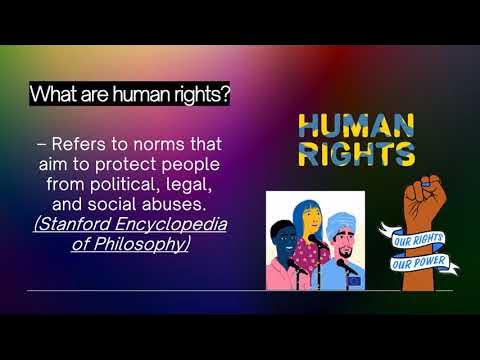Gen. Info - Art. 3: Bill of Rights
Summary
TLDRThis video outlines key rights and freedoms enshrined in the 1987 Philippine Constitution, emphasizing protections against self-incrimination, political detention, involuntary servitude, excessive fines, and cruel punishment. It highlights the right to bail, the abolition of the death penalty, and protections against double jeopardy. The video also details specific rights, such as freedom of political expression, the prohibition of modern slavery, and safeguards against harsh penalties, ensuring fairness and justice in legal proceedings. It serves as an informative guide to understanding essential constitutional rights in the Philippines.
Takeaways
- 😀 The 1987 Philippine Constitution emphasizes the importance of human rights protection, ensuring freedoms like expression and protection from unfair legal treatment.
- 😀 The right against self-incrimination prevents the government from compelling an individual to testify in a way that could incriminate them.
- 😀 Political freedom is guaranteed under the Constitution, safeguarding individuals from being arrested due to political beliefs or criticisms of the government.
- 😀 Involuntary servitude, or forced labor, is prohibited under the Constitution, with certain exceptions for military or civil service and punishments for crimes.
- 😀 The right against excessive fines ensures that fines are reasonable and within the legal limits, preventing unjust financial burdens on individuals.
- 😀 The Constitution prohibits cruel, degrading, and inhumane punishment, ensuring that penalties are humane and proportional to the offense.
- 😀 The right to bail allows individuals accused of crimes to post bail and secure their release, except for serious offenses punishable by life imprisonment or when evidence of guilt is strong.
- 😀 The death penalty was abolished by the 1987 Constitution, although the Congress can still pass laws imposing it for particularly heinous crimes.
- 😀 The right against double jeopardy ensures that a person cannot be tried twice for the same offense, promoting fairness in the legal process.
- 😀 There are limitations to double jeopardy: it only applies to criminal cases, and does not prevent multiple prosecutions for different offenses committed by the same individual.
Q & A
What is the importance of the right to due process as explained in the video?
-The right to due process ensures that individuals are treated fairly by the government. It involves a fair trial, equal protection, and the right to present evidence, aiming to protect against unjust or arbitrary actions by the state.
How does the Philippine Constitution protect citizens from self-incrimination?
-The right against self-incrimination prevents the government from forcing individuals to testify in a way that could incriminate them during a criminal trial, ensuring the accused cannot be compelled to give testimony that would lead to their own conviction.
What was the historical context for the inclusion of the right to express political beliefs in the new constitution?
-The right to express political beliefs was included in the new constitution to prevent a repeat of the abuses during the Marcos regime, where political opponents and critics of the government were arrested and silenced, becoming political prisoners.
What does the Constitution say about involuntary servitude?
-The Constitution prohibits involuntary servitude, which is modern-day slavery. However, there are exceptions, such as for punishment for a crime, military or civil service, work orders by labor authorities, or parental control over children.
How is an excessive fine defined, and why is it prohibited?
-An excessive fine is one that is unreasonable or beyond the limits set by law. The Constitution prohibits such fines to ensure that punishments are proportional to the crime committed, preventing unjust financial penalties.
What types of punishment are considered cruel, degrading, and inhumane according to the Constitution?
-Cruel, degrading, and inhumane punishment includes practices such as physical mutilation or excessive torture, such as cutting off fingers or other body parts, which are specifically prohibited by the Constitution.
What is the right to bail, and in which cases can it be denied?
-The right to bail allows a person arrested to pay a bond to ensure they will appear in court. Bail can be denied if the crime is punishable by reclusion perpetua (imprisonment for at least 20 years) or if the evidence of guilt is strong.
Why was the death penalty abolished in the 1987 Philippine Constitution?
-The death penalty was abolished in the 1987 Constitution to prevent the irreversible consequences of an unjust execution. However, Congress retains the power to reinstate it for heinous crimes, though this power has not been exercised in recent years.
What is double jeopardy, and how does it protect an accused person?
-Double jeopardy prevents a person from being tried twice for the same crime. If someone is acquitted of a crime, they cannot be retried for the same offense, ensuring that individuals are not subjected to repeated legal jeopardy.
Can double jeopardy apply in cases involving multiple offenses?
-No, double jeopardy does not apply to cases involving multiple offenses. An individual acquitted of one crime can still be tried for other distinct crimes committed in the same incident.
Outlines

This section is available to paid users only. Please upgrade to access this part.
Upgrade NowMindmap

This section is available to paid users only. Please upgrade to access this part.
Upgrade NowKeywords

This section is available to paid users only. Please upgrade to access this part.
Upgrade NowHighlights

This section is available to paid users only. Please upgrade to access this part.
Upgrade NowTranscripts

This section is available to paid users only. Please upgrade to access this part.
Upgrade NowBrowse More Related Video
5.0 / 5 (0 votes)





